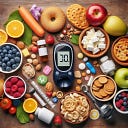Best Medicine For Diabetes Type 2
Discover the best medicine for Type 2 diabetes and see how the right choice can change your life. Learn more!
Best Medicine for Type 2 Diabetes — hi! Are you wondering if you’re on the best path for managing your Type 2 diabetes?
When Maria, a dedicated teacher, first learned she had Type 2 diabetes, she felt overwhelmed. Her journey began with a quest for the right medication. Maria’s story is one of many that highlight the importance of finding the best medicine for Type 2 diabetes.
Each medication has its role, but the right choice can make a significant difference in managing blood sugar levels and improving quality of life.
In this article, we’ll explore how different medications work, share personal stories, and provide insights into managing Type 2 diabetes effectively.
You’ll discover how medications like Metformin, Sulfonylureas, DPP-4 Inhibitors, GLP-1 Agonists, SGLT2 Inhibitors, and others can play a crucial role in your diabetes management. We’ll also look at real-life experiences to guide you in choosing the best treatment.
Key Takeaways:
- Metformin is often the first choice for managing Type 2 diabetes, effectively reducing glucose production and improving insulin sensitivity.
- Sulfonylureas stimulate insulin production, making them a useful addition when Metformin alone isn’t sufficient.
- DPP-4 Inhibitors enhance natural insulin response, offering better glucose control with fewer side effects.
- GLP-1 Receptor Agonists not only regulate blood sugar but also aid in weight management.
- SGLT2 Inhibitors help excrete excess glucose through urine and can assist with weight loss.
- Thiazolidinediones improve insulin sensitivity but may lead to weight gain.
- Insulin Therapy provides a direct approach to managing blood sugar, especially in advanced stages of diabetes.
Explore the best medicine for Type 2 diabetes today!
Choosing the best medicine for Type 2 diabetes depends on various factors, including individual health conditions, other medical issues, and the specific characteristics of the diabetes.
Here’s an overview of commonly prescribed medications:
- Metformin: Often the first line of treatment. It helps improve insulin sensitivity and lower glucose production in the liver.
- Sulfonylureas (e.g., glipizide, glyburide): These stimulate the pancreas to produce more insulin.
- DPP-4 Inhibitors (e.g., sitagliptin, saxagliptin): They help increase insulin production and decrease glucose production.
- GLP-1 Receptor Agonists (e.g., liraglutide, exenatide): These help increase insulin production, decrease glucose production, and slow stomach emptying.
- SGLT2 Inhibitors (e.g., empagliflozin, canagliflozin): They help remove glucose through urine and can also aid in weight loss.
- Thiazolidinediones (e.g., pioglitazone, rosiglitazone): These improve insulin sensitivity but may have side effects like weight gain.
- Insulin: Sometimes used if other medications are not sufficient or if there is significant insulin deficiency.
The choice of medication should be personalized, considering factors like effectiveness, side effects, cost, and any other health conditions. It’s best to consult with a healthcare provider to determine the most appropriate treatment plan for your specific situation.
People Also Ask:
- What is the most common medication prescribed for Type 2 diabetes?Metformin is the most commonly prescribed medication for Type 2 diabetes due to its effectiveness in reducing blood sugar levels and improving insulin sensitivity.
- How do Sulfonylureas help manage Type 2 diabetes? Sulfonylureas stimulate the pancreas to produce more insulin, which helps lower blood sugar levels when Metformin alone isn’t enough.
- What are the benefits of DPP-4 Inhibitors for Type 2 diabetes? DPP-4 Inhibitors enhance the body’s natural insulin response and help regulate blood sugar levels without causing significant side effects.
- Can GLP-1 Receptor Agonists aid in weight loss? Yes, GLP-1 Receptor Agonists not only help manage blood sugar levels but also slow stomach emptying and reduce appetite, contributing to weight loss.
- How do SGLT2 Inhibitors work for Type 2 diabetes? SGLT2 Inhibitors prevent glucose from being reabsorbed in the kidneys, leading to excess glucose being excreted in the urine, which helps control blood sugar levels.
- What are the side effects of Thiazolidinediones? Thiazolidinediones can improve insulin sensitivity but may cause weight gain and other side effects.
- When should insulin therapy be considered for Type 2 diabetes?Insulin therapy is often considered when other medications are insufficient or when there is significant insulin deficiency.
Glossary Terms:
- Metformin: A medication used to improve insulin sensitivity and reduce glucose production in the liver.
- Sulfonylureas: A class of drugs that stimulate the pancreas to produce more insulin.
- DPP-4 Inhibitors: Medications that prolong the action of incretin hormones to enhance insulin production.
- GLP-1 Receptor Agonists: Drugs that increase insulin production, decrease glucose production, and slow stomach emptying.
- SGLT2 Inhibitors: Medications that prevent glucose reabsorption in the kidneys, leading to glucose excretion through urine.
Disclaimer:
This article is for educational purposes only and does not replace professional medical advice. The article contains affiliate links, so if you purchase products through my recommendations, I may earn a commission.
